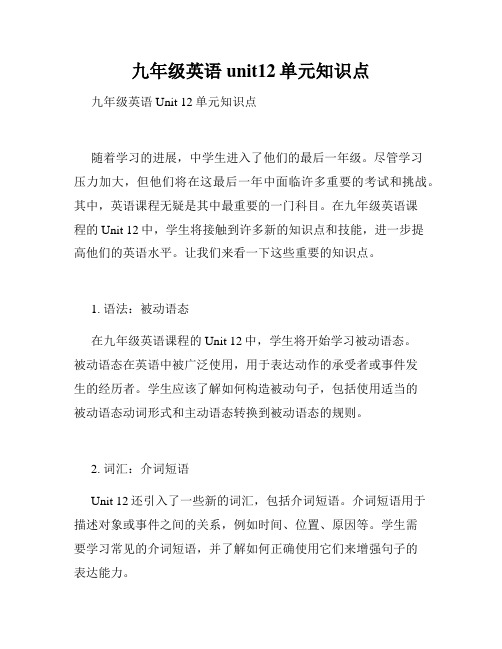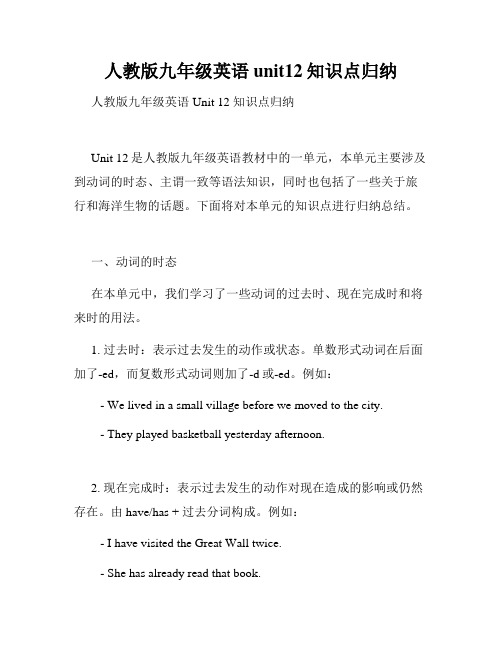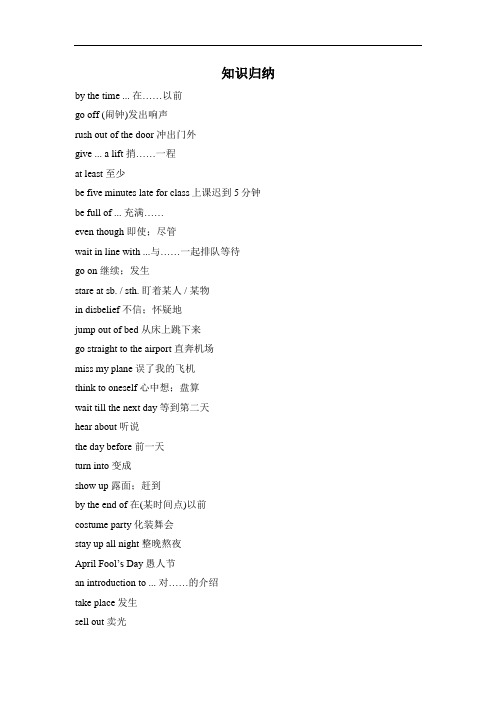2010中考英语复习课本知识整理九年级Unit12
- 格式:doc
- 大小:190.50 KB
- 文档页数:14

九年级英语unit12单元知识点九年级英语Unit 12单元知识点随着学习的进展,中学生进入了他们的最后一年级。
尽管学习压力加大,但他们将在这最后一年中面临许多重要的考试和挑战。
其中,英语课程无疑是其中最重要的一门科目。
在九年级英语课程的Unit 12中,学生将接触到许多新的知识点和技能,进一步提高他们的英语水平。
让我们来看一下这些重要的知识点。
1. 语法:被动语态在九年级英语课程的Unit 12中,学生将开始学习被动语态。
被动语态在英语中被广泛使用,用于表达动作的承受者或事件发生的经历者。
学生应该了解如何构造被动句子,包括使用适当的被动语态动词形式和主动语态转换到被动语态的规则。
2. 词汇:介词短语Unit 12还引入了一些新的词汇,包括介词短语。
介词短语用于描述对象或事件之间的关系,例如时间、位置、原因等。
学生需要学习常见的介词短语,并了解如何正确使用它们来增强句子的表达能力。
3. 阅读理解:科技与未来英语课程的Unit 12涵盖了科技与未来的主题。
学生将会读到一些与科技和未来发展相关的文章,包括科技创新、环境可持续性等方面的内容。
通过阅读这些文章,学生将进一步培养他们的阅读理解能力,并学会如何从文章中找到关键信息。
4. 写作技巧:写一篇科技发展的短文在Unit 12的写作任务中,学生将被要求写一篇关于科技发展的短文。
他们需要展示对科技发展趋势的理解,并提出自己的观点和看法。
这个任务将帮助学生提高他们的写作技巧,同时培养他们的逻辑思维和表达能力。
5. 口语表达:讨论和辩论在Unit 12的口语任务中,学生将分组进行讨论和辩论。
他们将就科技与未来的话题展开思考,提出自己的观点,并试图说服别人。
这个任务将帮助学生提高他们的口语表达能力,并锻炼他们的团队合作和交流技巧。
总的来说,九年级英语Unit 12提供了丰富的学习内容,包括语法、词汇、阅读理解、写作和口语表达等方面的知识点。
学生需要努力学习和掌握这些知识点,以便在最后一年中取得进一步的提高。

九年级英语Unit 12 知识点Unit 12 Knowledge Points in Grade Nine EnglishIntroductionIn the ninth-grade English curriculum, Unit 12 covers various knowledge points. This unit aims to strengthen students' language skills, enhance their understanding of different contexts, and expand their vocabulary. In this article, we will explore some key aspects of Unit 12, providing a comprehensive overview that will assist students in their language acquisition journey.Listening SkillsLanguage learning involves effective listening, which is a foundational skill. Unit 12 emphasizes the development of listening comprehension. To improve this skill, students can engage in activities such as listening to podcasts, watching movies or TV shows in English, and participating in group discussions. Through these activities, students can familiarize themselves with different accents, colloquial expressions, and intonation patterns.Reading SkillsIn Unit 12, students will encounter a variety of reading materials, including narrative texts, articles, and nonfiction passages. To enhance reading skills, it is important to practice extensive reading. Students can select books or articles of interest, read newspapers, or explore online resources to broaden their exposure to different topics and writing styles. Additionally, they should focus on comprehension and develop strategies such as skimming, scanning, and predicting to enhance their reading speed and overall understanding.Writing SkillsUnit 12 aims to improve students' writing skills by introducing various writing tasks. These tasks may include writing essays, formal letters, or informal emails. To excel in writing, students should develop a systematic approach. Planning the structure of their writing, brainstorming ideas, and organizing content in a logical manner are important steps. Moreover, practicing different writing styles and adopting appropriate vocabulary and grammar will enhance the effectiveness and coherence of their written work.GrammarGrammar plays a crucial role in language proficiency. Unit 12 focuses on various grammar structures such as passive voice, reported speech, and conditional sentences. To master these structures, studentsshould practice actively, working on exercises that target each specific grammar point. Additionally, they can review grammar rules through online resources, textbooks, or seek guidance from their teachers.Vocabulary ExpansionExpanding vocabulary is essential for effective communication. Unit 12 introduces new vocabulary related to various topics, such as travel, technology, and education. To enhance vocabulary, students can create flashcards, categorize words into groups, or use online tools and apps designed for language learning. Incorporating new words into daily conversations and writing will also help students reinforce their understanding and application of vocabulary.Speaking SkillsDeveloping speaking skills is integral to real-life communication. Unit 12 provides opportunities for students to engage in discussions, debates, and presentations. To improve speaking abilities, students should actively participate in class activities and engage in conversations with classmates and teachers. Taking advantage of language exchange programs, language clubs, or practicing with language-learning apps will also provide additional platforms for oral practice.ConclusionUnit 12 in the ninth-grade English curriculum covers a range of essential knowledge points. By focusing on listening skills, reading skills, writing skills, grammar, vocabulary expansion, and speaking skills, students can enhance their overall language proficiency. Continuous practice, utilizing various resources, and seeking guidance from teachers will undoubtedly guide students towards mastering the content of Unit 12 and becoming more confident English speakers and writers.。

九年级英语unit12知识点总结九年级英语Unit 12 知识点总结九年级英语的学习往往以Unit为单位进行,其中Unit 12是一个非常重要的单元。
这个单元主要以“Technology”为主题,涵盖了许多与科技相关的话题,如电脑、网络、手机等。
在这个单元中,我们学习了很多知识点,下面对其中的一些重点进行总结。
首先,我们学习了关于电脑的一些词汇和短语。
例如,我们学习了“computer”(电脑),“keyboard”(键盘),“mouse”(鼠标)等等。
我们还学习了如何描述电脑的使用和功能,比如“surf the Internet”(上网),“send emails”(发送邮件),“play games”(玩游戏)等等。
这些词汇和短语对于我们理解和应用相关的文本非常重要。
其次,我们学习了有关网络和社交媒体的一些知识。
现代社会离不开网络和社交媒体,因此我们要了解相关的词汇和表达方式。
我们学习了“website”(网站),“blog”(博客),“online shopping”(网上购物)等等。
此外,我们还学习了如何表达自己对网络的看法,关注网络安全等方面的知识。
在这个单元中,我们还学习了关于手机的一些知识。
手机在今天的生活中起着重要的作用,因此我们要了解一些与手机相关的词汇和表达方式。
我们学习了“mobile phone”(手机),“text messages”(短信),“call someone”(给某人打电话)等等。
我们还学习了如何描述手机的功能和使用方式,以及如何使用手机进行沟通和交流。
除了学习具体的词汇和短语,我们还学习了一些语法知识。
比如,我们学习了“used to +动词原形”和“be used to +动名词/名词短语”,用来描述过去的习惯和适应现状。
我们还学习了“too + 形容词/副词”和“enough + 名词”,用来描述程度。
在这个单元的学习中,我们还参与了一些小组活动和讨论,练习了口语和写作能力。

人教版九年级英语unit12知识点归纳人教版九年级英语Unit 12 知识点归纳Unit 12是人教版九年级英语教材中的一单元,本单元主要涉及到动词的时态、主谓一致等语法知识,同时也包括了一些关于旅行和海洋生物的话题。
下面将对本单元的知识点进行归纳总结。
一、动词的时态在本单元中,我们学习了一些动词的过去时、现在完成时和将来时的用法。
1. 过去时:表示过去发生的动作或状态。
单数形式动词在后面加了-ed,而复数形式动词则加了-d或-ed。
例如:- We lived in a small village before we moved to the city.- They played basketball yesterday afternoon.2. 现在完成时:表示过去发生的动作对现在造成的影响或仍然存在。
由have/has + 过去分词构成。
例如:- I have visited the Great Wall twice.- She has already read that book.3. 将来时:表示将来要发生的动作或存在的状态。
由will + 动词原形构成。
例如:- We will go to the beach tomorrow.- They will have a party next week.二、主谓一致主谓一致是指主语和谓语在人称和数上保持一致。
在本单元中,我们需要特别注意以下几点:1. 主语为第三人称单数时,谓语动词需要加-s或-es。
例如:- He often goes to the cinema on weekends.2. 表示时间、距离、金钱等的量词作主语时,谓语动词的单复数形式与它们代表的数量有关。
例如:- Ten yuan is enough to buy a drink.三、旅行话题在本单元中,我们学习了一些与旅行相关的词汇和句型,并通过对话的形式来进行实际应用。

知识归纳by the time ... 在……以前go off (闹钟)发出响声rush out of the door 冲出门外give ... a lift 捎……一程at least 至少be five minutes late for class上课迟到5分钟be full of ... 充满……even though 即使;尽管wait in line with ...与……一起排队等待go on 继续;发生stare at sb. / sth. 盯着某人 / 某物in disbelief 不信;怀疑地jump out of bed 从床上跳下来go straight to the airport 直奔机场miss my plane 误了我的飞机think to oneself 心中想;盘算wait till the next day 等到第二天hear about 听说the day before 前一天turn into 变成show up 露面;赶到by the end of 在(某时间点)以前costume party 化装舞会stay up all night 整晚熬夜April Fool’s Day愚人节an introduction to ... 对……的介绍take place 发生sell out 卖光lose weight 减肥find out 弄清;查明cancel his show 取消他的节目police officers 警官rush to ... 匆忙去……more than 超过;多于run away from 逃离on the first day of school在上学第一天turn around 转向;回转hand in 上交be about to do sth. 正要做某事end up doing sth. 以做某事告终。

九班级课文重点背诵〔Unit Twelve〕1、到我起床的时候,我的兄弟已经进了淋浴房。
2、当我到达学校的时候,我意识到把书包忘在家里了。
3、我返回学校的时候,上课铃声已经响过了。
4、我的闹铃没有响,我始终在睡觉。
5、卡尔的爸爸观察我在街上,让我搭了便车。
6、你只迟到了五分钟。
7、生活布满了意想不到的事情。
8、我刚要上去,这时我打算先买一杯咖啡。
9、当我和其他职员排队等候的时候,听到了巨大的响声。
10、我还没来得及参加外面的人群看看发生了什么事情,第一架飞机已经撞上了我工作的办公大楼。
11、我们带着疑心的眼光盯着从燃烧着的楼房上方升起的黑烟。
12、我意识到我的闹钟没有响。
13、我从床上跳下来,直奔机场。
14、当我到达机场的时候,去新西兰的飞机已经起飞了。
15、这是我一年当中休的第一个假。
16、我听说前一天新西兰发生了地震。
17、我的坏运气意外变成了好事情。
18、当我上完语言课回家的时候,妈妈已经做好了苹果馅饼。
19、当我抵达晚会的时候,其他每个人都在场了。
20、她没来得及有时机辞别,他就冲出了大楼。
21、愚人节戴维发生了什么事情?一位伴侣邀请他去参与扮装舞会了。
22、愚人节是一个在全世界不同的国家进行的庆祝日。
23、愚人节每年四月一日来到,是很多人相互戏弄开玩笑的一天。
24、一位记者宣布不会再有意大利面条了。
1. By the time I got up, my brother ____ already _______ in the shower.2. When I got to school, I realized I ____ ______ my backpack at home.3. By the time I got back to school, the bell ____ ______.4. My alarm clock didn’t go ____! I kept _________.5. Carl’s dad saw me on the street and gave me ___ _____ in his car.6. You were only five minutes ____ ____ class.7. Life is full of ____ ___________.8. I was ______ to go up _____ I decided to get a coffee first.9. As I was waiting __ ____ with other office workers, I heard a loud sound.10. ______ I could join the others outside to see what was ______ ___,the first plane had already hit my office building.11.We stared ___ _________ at the black smoke _______ above theburning building.12. I realized that my alarm never ____ ____.13. I jumped out ___ bed and went ________ to the airport.14. By the time I got to the airport, my plane to New Zealand had already______ ____.15. This is the first holiday that I’ve _______ in a year.16. I heard ______ the earthquake in New Zealand the day _______.17. My bad luck had unexpectedly ______ ____ a good thing.18. By the time I got home from my language ________, my mother hadfinished _______ the apple pie.19. By the time I arrived at the party, everyone else had already ______ ___.20. _______ she got a chance to say goodbye, he had rushed out the building.21. What happened____ Dave on April Fool’s Day. A friend invited him__acostume party.22.April Fool’s Day is a celebration that _____ ____ in different countriesaround the world.23.April Fool’s Day _______ on April first every year and is a day _____many people play all kinds of tricks and jokes on each other.24. A reporter announced there would be ___ _____ spaghetti.九班级课文重点背诵〔Unit Twelve〕25、很多人跑到当地的超市购置尽可能多的意大利面条。
英语第九年级12课知识点第一部分:词汇和短语本课程的第一部分是词汇和短语,这些是你学习英语的基础。
掌握这些词汇和短语将有助于你更好地理解和运用英语语言。
1. 教育词汇:- Education(教育)- Knowledge(知识)- Teacher(教师)- Student(学生)- School(学校)2. 社交短语:- How are you?(你好吗?)- Nice to meet you(很高兴见到你)- Thank you(谢谢你)- You're welcome(不用谢)- Excuse me(请原谅我)第二部分:语法知识在学习英语时,语法是一个重要的组成部分。
了解和掌握不同的语法知识将有助于你正确地构建句子和表达自己。
1. 现在进行时:- 结构:主语 + am/is/are + 动词 + -ing- 例句:I am studying English.(我正在学习英语)2. 一般现在时:- 结构:主语 + 动词- 例句:He plays soccer every day.(他每天踢足球)3. 一般过去时:- 结构:主语 + 动词的过去式- 例句:She went to the park yesterday.(她昨天去了公园)第三部分:阅读理解和听力技巧为了提高你的英语技能,阅读理解和听力技巧是必不可少的。
下面是一些建议,帮助你更好地理解和运用英语。
1. 阅读理解技巧:- 仔细阅读问题和文章,确保你理解了问题的意思。
- 在阅读时标记重要的信息和关键词。
- 注意上下文推理,根据文章中的线索回答问题。
2. 听力技巧:- 提前阅读问题,了解你需要听到的关键信息。
- 注意听力材料中的关键词和短语。
- 练习听力,多听英语广播和音频材料。
第四部分:口语练习和写作技巧为了加强英语口语和写作能力,以下是一些建议和技巧。
1. 口语练习:- 多与其他学生或母语为英语的人进行对话练习。
- 使用学过的词汇和短语构建句子,并尝试进行简单的对话。
九年级Unit12知识点一、单元短语集锦1. give ... a lift捎(某人)一程2. be full of充满了3. by the time到......时候4.be late for迟到5. go off发出响声6. keep doing sth一直做......7. wake up醒来8. rush out冲出9. stare at sb凝视某人10.in disbelief难以置信11. show up露面12.arrive in/ at到达13.be about to do sth即将做......14.even though即使;尽管15.wait in line排队等候16.take off起飞17. turn into转变成18.costume party化妆舞会19.sellout卖光20.getdressed穿衣服21.stayup熬夜22.allnight整夜23.Sthhappenedtosb.某人发生某事24.take place发生25.play a joke on sb.跟某人开玩笑26. play a trick on sb捉弄某人27.as ... as sb can尽可能.......28. lose weight减肥29. end up doing sth结束做某事30.get married结婚31. the luckiest day最幸运的一天32.in the middle of ...在......中间33.after that在那之后34.lead to通向35. a bowl of...一碗......36.so ... that...如此.......一致......37.miss doing sth错过做某事2)forget“忘记”,侧重指忘记某件事情,后常跟to do (忘了要去做)或doing (忘了做过)。
【拓展】♦leave→left→left v离开(1)leave sth +地点把某物遗忘在某地(2)leave for +地点离开去某地(3) leave a message留言ask for leave请假leave school (中学)毕业(4)leave one by oneself=leave sb alone把某人单独留下【注意】英语中表示“把某物遗忘在某处”常用leave +地点而不是forget+地点Unluckily, I left my book at home【延伸】动词leave的第三人称单数形式为leaves;而名词leaf的复数也是leaves.【2013江苏无锡】I didn’t realize I __________(leave) the key at home until I got to my car. So I had to go back.【2013甘肃兰州】I overslept this morning. By the time I got to the train station, the train ________ (leave).【2011广西贵港】—Lin Kai, hand in your homework, please.—Oh, sorry. I_____ it at home this morning.A. was leaving B. has left C. will leave D. left【2013山东枣庄】By the time I locked the door, I realized I ___my keys at home.A. had repaired B. had changed C. had forgotten D. had left【2013齐齐哈尔】-I’m sorry, Mr. Li. I _____ my English homework at home.-Don’t forget ________ it to school tomorrow. A. left, to bring B. forgot, to take C. lost, to bringforget→forgot→forgotten v忘记(1) forget sth忘记某事(不能跟地点状语连用)He forgot his grandfather’s name.(2) forget to do sth忘记去做某事(未做)Don’t forget__________(post) the letter for me on your way home.【2014河北中考】33. Don’t forget ______ th anks when other people help you.A. acceptB. to acceptC. sayD. to say(3) forget doing sth忘记做过某事(已做)【记】I never forget to take umbrella with me, but today I left my umbrella in that shop.() I _______ to tell him the news that Tom was ill. A. left B. leave C. forget D. forgot【2013江苏常州】I believe that an important moment like this should_______ (not forget).【2013黑龙江齐齐哈尔】24.-I’m sorry, Mr. Li. I _____ my English homework at home.-Don’t forget it to school tomorrow. A. left, to bring B. forgot, to take C. lost, to bring【2014浙江宁波】33.—I’m sorry about last night. It was my fault .—_____A. Forget it B. No way C. Go head D. My pleasure3—He has to stay in Thailand for onemore week because his passport and ID card were stolen.—___________________.A. Forget it B. It d oesn’t matter C. I’m sorry to hear that D. Great【2014四川达州】25.—I’m sorry I ________ my exercise book at home this morning.—It doesn’t mater. Don’t forget ________ it herethis afternoon.A. left; to take B. forgot; bringing C. left; to bring D. forgot; to bring知识点1.Life is full of the unexpected.【解析1】be full of = be filled with充满,装满Section A.①Our life is ______________chances, but there are also a lot of challenges.(充满)②The box is_______________(装满) books.()③On hearing the news, her heart was _____ grati tude.A. filled ofB. full withC. filled withD. fill with【2013莱芜】77. If you read a lot, your life will be full ________ pleasure.A. by B. of C. for D. With【2014辽宁丹东】—________ .—So she is. because she takes a lot of exercise every day.A. knowledge B. courage C. change D. energy【解析2】unexpected adj.出乎意料的;始料不及的the unexpected“意外的事情”“出乎意料的事”。
九年级全一册英语Unit12知识点归纳在九年级的英语学习中,Unit12是一个重要的单元,主要讲解了如何在日常生活中进行购物、交流和提供帮助的相关表达。
下面是对这一单元的知识点进行归纳总结。
一、购物方式:1. 实体店购物:实体店购物是最常见的购物方式,可以亲自去商店挑选自己喜欢的商品,也可以与销售员进行交流咨询。
2. 网上购物:在如今的互联网时代,网上购物已经成为人们生活的一部分。
通过电脑或手机,我们可以在网上搜索并购买各种商品。
3. 二手交易:如果你想要购买廉价的二手商品,可以考虑参与二手交易。
这种方式相对便宜,但需要小心鉴别商品的质量。
二、购物时的交流:1. 询问价格:如果你对某个商品感兴趣,可以使用以下表达方式询问价格: - How much is this/that?- How much does it cost?- What's the price?2. 购买商品:当你决定购买某个商品时,可以使用以下表达方式:- I'll take this/that one.- I want to buy this/that one.- I'd like to purchase this/that one.3. 比较商品:在购物时,我们常常需要比较不同商品的特点和价格。
以下表达方式可以帮助你进行比较:- Which one is cheaper, this one or that one?- What's the difference between this one and that one?- I think this one is better because...4. 付款方式:购物时,需要选择合适的付款方式。
以下是常见的付款方式: - Can I pay in cash?- Do you accept credit cards?- Can I use mobile payment like Alipay or WeChat Pay?5. 请求帮助:如果你在购物过程中遇到问题,可以用以下表达方式请求帮助:- Excuse me, can you help me?- Could you please assist me?- I need your help.三、购物中的礼貌用语:1. 感谢和道别:在购物过程中,我们要学会用礼貌的方式表达感谢和道别: - Thank you for your help.- Thanks a lot.- Have a nice day!2. 道歉和请求:如果我们在购物中犯了错或者需要别人帮助,要学会道歉和请求:- I'm sorry for the inconvenience.- Could you please help me with this?- I apologize for the mistake.四、购物时遇到的问题和解决办法:1. 商品不满意:如果购买的商品有质量问题或者与描述不符,可以进行退货或者换货:- I want to return this product because it's broken.- This item is not what I expected. Can I exchange it for another one?- Can I have a refund?2. 付款问题:在付款时可能会出现问题,可以寻求帮助解决:- I'm having trouble with the payment. Can you help me?- My credit card is not working. Is there another way to pay?- The payment machine is not giving me a receipt. What should I do?在Unit12的学习中,我们学到了购物的方式、交流技巧以及解决问题的方法,这些知识对我们日常的生活和未来的职业发展都具有重要意义。
【知识梳理】I.要点短语II.重要句型2010 中考英语复习课本知识整理Unit 1-21 not at all 一点也不2 end up 最后3 make mistakes 出错误4 later on 随后5 be afraid to 惧怕6 laugh at 嘲讽7 take note 做笔录8 look up 查(词典 )9 make up 构成10 get excited 感觉喜悦11 to begin with 开始12 it doesn't matter (if) ( 假如 ..) 不是问题13 change...into... 把 ... 变为 ( 当作 )...14 regards ...as... 视 ... 为15 stay angry(for years)...(about)( 为 ...) 生气了 ( 好多年 )16 go by ( 时间)流逝17 decide not to do Sth 决定不做某事18 deal with 解决19 compare...to... 与 ... 做比较20 worry about 担忧 ...21 break off 中止 ,停止22 try one's best 尽某人的力23 be angry with - 对 ... 生气24 with the help on/of 在 ... 的帮助下25 keep a diary 记日志26 working with friends 和朋友一同工作 / 学习27 break off a friend ship 中止友情 ( 断交 )28 by think of a problem 经过思虑问题29 in a positive way 经过乐观的方法 / 想法1. one of +(the+ 形容词最高等 )+ 名词复数形式此中之一2.see sb. / sth. doing 看见某人正在做某事重申正在发生3.It ’ s + 形容词 +(for sb. ) to do sth. ( 关于某人来说 ) 做某事4. it seems that...----------------------- 看起来III.重要语法此刻达成时态反意疑问句【课文分析】要点单词1. pronounce v.发音Can you pronounce these words?你会发这些单词的音吗?(1)pronounce不及物动词,意为“发音”。
2010中考英语复习课本知识整理Unit 1-2【知识梳理】I. 重点短语 1 not at all 一点也不2 end up最后3 make mistakes犯错误4 later on随后5 be afraid to 害怕6 laugh at嘲笑7 take note 做笔记8 look up 查(字典)9 make up 组成10 get excited 感到兴奋11 to begin with 开始12 it doesn't matter (if) (如果..)不是问题13 change...into... 把...变成(当成)...14 regards ...as... 视...为15 stay angry(for years)...(about)(为...)生气了(很多年)16 go by (时间)流逝17 decide not to do Sth 决定不做某事18 deal with 解决19 compare...to... 与...做比较20 worry about 担心...21 break off 中断,停止22 try one's best 尽某人的力23 be angry with -对...生气24 with the help on/of 在...的帮助下25 keep a diary 记日记26 working with friends 和朋友一起工作/学习27 break off a friend ship 中断友谊(绝交)28 by think of a problem 通过思考问题29 in a positive way 通过乐观的方法/想法II. 重要句型 1.one of +(the+ 形容词最高级)+名词复数形式…其中之一2.see sb. / sth. doing 看见某人正在做某事强调正在发生3.It’s +形容词+(for sb. ) to do sth. (对于某人来说)做某事…4. it seems that...-----------------------看起来……III. 重要语法✧现在完成时态✧反意疑问句【课文解析】重点单词1.pronounce v.发……音Can you pronounce these words? 你会发这些单词的音吗?(1)pronounce 不及物动词,意为“发……音”。
Pronounce your words clearly.你把单词的音发清楚。
I don't know how to pronounce the word.我不知道怎样读那个单词。
(2)pronounce的名词形式为pronunciation。
a word with two pronunciations 一个有两种发音的单词He speaks English fluently,but his pronunciation is poor.他英语说得很流利,但他的发音不好。
4.afraid adj .害怕的Are you afraid to go out alone at night? 你害怕夜晚独自出去吗?afraid意为“害怕的,恐怕”,在句中常作表语。
常用结构有:be afraid of sth.“害怕某事”.be afraid to do sth.“害怕做某事”.be afraid+ that“恐怕……”。
I am afraid of snakes.我怕蛇。
He is afraid to go to Beijing by himself.他害怕一个人去北京。
I'm afraid that he won't come this evening.我恐怕他今天晚上不会来了。
5.afford v.买得起,提供This kind of computer is too expensive and I can't afford it.这种电脑太贵了,我买不起。
afford常用作及物动词,意为“买(经受)得起……;给予,提供”,其后常接名词、代词或动词不定式作宾语,afford后还可接双宾语。
At last I can afford a watch.我终于买得起一只手表了。
I could not afford so much money for a bicycle.我出不起那么多钱买一辆自行车。
I'll afford you a chance.我将给你提供一个机会。
①一Do you learn English by reading aloud?一Yes.1 often read aloud to practice my___________(pronounce).②He is ____________dogs,so he never keeps any of them at home.A.interested in B.afraid of C.worried about D.interesting in③The art club is for members only.You can't go in____________ you are a member.A.unless B.because C.if D.though④一Listen! is Professor Johnson giving a report.n the hall?一No,it _______be him.He has gone to Japan.A.needn't B.may not C.mustn't D.can't⑤We can hardly to buy this kind of computer because it is too expensive.A.offer B.afford C.able D.have⑥Classes will begin in five minutes and_ _ that Arthur will be late.A.I believe B.I think C.I am afraid D.I am sure⑦一Why do you turn down the radio?一I'm ____waking the baby.A.afraid of B.busy with C.careful for D.willing to他在电话薄里查了一下号码,找到了汤姆的电话号码。
2.regard…as…把……当作.把……看作Regard problems as challenges.把问题看作是挑战。
思维拓展regard…as…同义词组有have…as…把……当作…”·;look on…as…把……看作……。
regard…as…侧重外部形象或主观视觉上的评价。
We all regard him as our friend.我们都把他当作我们的朋友。
have…a s…侧重“让某人当……,推选某人当……”。
We have him as our monitor.我们让他当我们的班长。
look on…as…与regard...as...意思相同,侧重“把……看作……”。
I look on him as a good friend.我把他视为好友。
3.end up结束。
告终His words ended up the class meeting.他的话结束了班会。
指点迷津(1)end up为动词短语,后面可直接加名词或动词的一ing形式。
end up doing sth.结束做某事。
They ended up travelling in Canada at the news.听到这个消息,他们结束了在加拿大的旅行。
(2)end up with表示“以……结束,告终”,其反义词组为start/begin with以……开始。
The English party began with an English song and ended up with a well—known piano music.英语晚会一首英文歌开始,以一首著名的钢琴曲结束。
思维拓展(1)in the end“最后,终于”,相当于at last,finally。
We won in the end.最后,我们取得了胜利。
(2)to the end表示到某一终点为止,指地点,也指时间。
Go down the street to the end and you will find the shop.沿着这条街走到尽头,你将会找到那个商店。
(3)by the end of到……为止,在……以前,常与过去完成时连用。
He had finished the work by the end of last month.上个月底以前他就已经完成了那项工作。
(4)at the end of在……末尾,在……尽头,后既可以接表示时问的名词,也可以接表示地点的名词。
The hospital is at the end of the road.医院就在路的尽头。
He will come to see you at the end of this month.这个月底他要来看你。
4.deal with处理How did you deal with the money? 你怎样处理那些钱?(1)deal with意为“处理,解决”,为动介结构短语,with为介词,其后常接trouble,problem等词。
I am good at dealing with pressure.我善于应付压力。
(2)deal with还可意为“与……打交道,与……做买卖”,此时,主语通常是表示人、公司、商店等的名词。
My eider brother will deal with you later on.我哥哥以后会来收拾你的。
指点迷津deal with与do with二者都有“处理,对付”之意。
(1)deal with侧重“方式方法”,常与how连用。
How are you going to deal with the TV set? 你打算怎么处理这台电视机?(2)do with侧重“对象”,往往与what搭配使用。
What are you going to do with the camera you found? 你打算怎么处理你找到的那部照相机?5.used to过去,过去经常I used to get up late in the morning.我过去早上起床很晚。
(1)"used to+动词原形”是英语中的一个常见的固定结构,意为“过去常常,以前经常”,表示已经过去的习惯或状态。